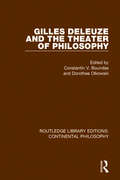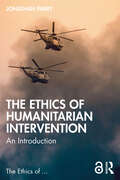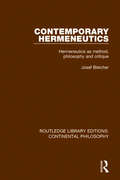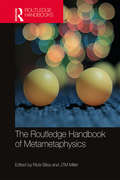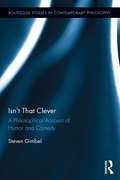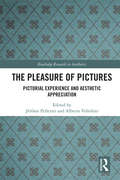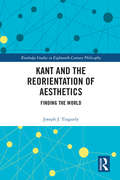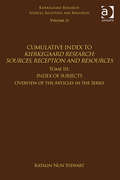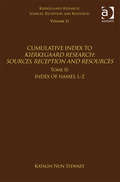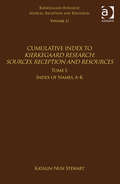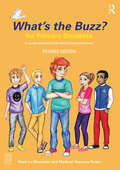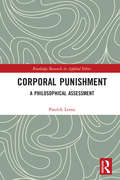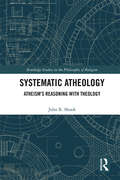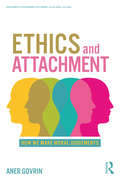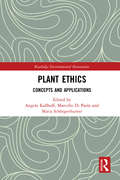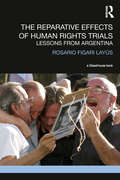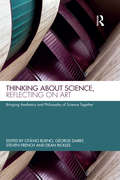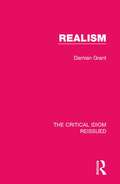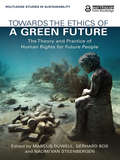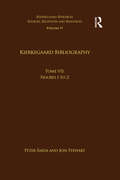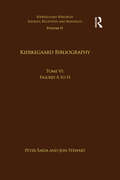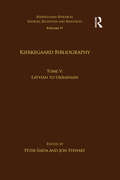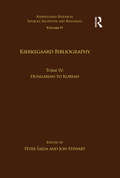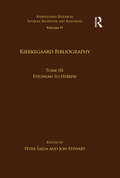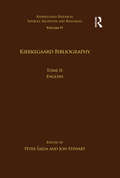- Table View
- List View
Gilles Deleuze and the Theater of Philosophy (Routledge Library Editions: Continental Philosophy #3)
by Constantin V. Boundas Dorothea OlkowskiThis collection, first published in 1994, contains thirteen critical essays by established scholars from the fields of philosophy, literary criticism, feminist theory, politics, and sociology, and a new essay by Deleuze himself. That the contributors are from a variety of fields indicates the extent to which Deleuze’s work can and will impact theory far beyond the discipline of philosophy.
The Ethics of Humanitarian Intervention: An Introduction (The Ethics of ...)
by Jonathan ParryFew topics generate as much controversy and debate as armed humanitarian intervention. Military force involves death and destruction, as well as interfering in other countries’ domestic affairs. But, crucially, non-intervention is also controversial. When confronted with humanitarian crises abroad, many feel that outsiders are not only justified in using force to halt the abuses, but that they must do so. The Ethics of Humanitarian Intervention: An Introduction offers a guide to these ethical debates.In clear and informative style Jonathan Parry explores the following topics: The morality of defending others, including the ‘responsibility to protect’ (R2P). State sovereignty and self-determination as barriers to intervention. The possibility of consensual intervention. Just causes for intervention: what kinds of human rights abuses warrant intervention? The effectiveness of intervention: does it work in practice? Alternatives to intervention, including aiding rebels, economic sanctions, and providing aid. Whether there is a duty to intervene. Examples of intervention – including the former Yugoslavia, Iraq, Liberia, and Libya – are used to illustrate the ethical dilemmas in question. The arguments of important theorists of intervention, such as John Stuart Mill, Michael Walzer and Jeff McMahan, are also explained clearly and critically. Each chapter concludes with questions for discussion and reflection. The Ethics of Humanitarian Intervention: An Introduction is ideal reading for students and researchers in philosophy, applied ethics, politics and international relations.Chapter 3 of this book is freely available as a downloadable Open Access PDF at http://www.taylorfrancis.com under a Creative Commons Attribution (CC-BY) 4.0 license.
Contemporary Hermeneutics: Hermeneutics as Method, Philosophy and Critique (Routledge Library Editions: Continental Philosophy #2)
by Josef BleicherHermeneutics can loosely be defined as the theory or philosophy of the interpretation of menaing. It is a central topic in the philosophy of the social sciences, the philosophy of art and language and in literary criticism. This book, first published in 1980, gives a detailed overview and analysis of the main strands of contemporary hermeneutical thought. It includes a number of readings in order to give the reader a first-hand acquaintance with the subjects and the debates within it.
The Routledge Handbook of Metametaphysics (Routledge Handbooks in Philosophy)
by Ricki Bliss J.T.M. MillerPhilosophical questions regarding the nature and methodology of philosophical inquiry have garnered much attention in recent years. Perhaps nowhere are these discussions more developed than in relation to the field of metaphysics. The Routledge Handbook of Metametaphysics is an outstanding reference source to this growing subject. It comprises thirty-eight chapters written by leading international contributors, and is arranged around five themes: • The history of metametaphysics • Neo-Quineanism (and its objectors) • Alternative conceptions of metaphysics • The epistemology of metaphysics • Science and metaphysics. Essential reading for students and researchers in metaphysics, philosophical methodology, and ontology, The Routledge Handbook of Metametaphysics will also be of interest to those in closely related subjects such as philosophy of language, logic, and philosophy of science.
Isn’t that Clever: A Philosophical Account of Humor and Comedy (Routledge Studies in Contemporary Philosophy)
by Steven GimbelIsn’t That Clever provides a new account of the nature of humor – the cleverness account – according to which humor is intentional conspicuous acts of playful cleverness. By defining humor in this way, answers can be found to longstanding questions about humor ethics (Are there jokes that are wrong to tell? Are there jokes that can only be told by certain people?) and humor aesthetics (What makes for a good joke? Is humor subjective?). In addition to humor in general, Isn’t That Clever asks questions about comedy as an art form such as whether there are limits to what can be said in dealing with a heckler and how do we determine whether one comedian has stolen jokes from another.
The Pleasure of Pictures: Pictorial Experience and Aesthetic Appreciation (Routledge Research in Aesthetics)
by Alberto Voltolini Jérôme PelletierThe general aim of this volume is to investigate the nature of the relation between pictorial experience and aesthetic appreciation. In particular, it is concerned with the character and intimacy of this relationship: is there a mere causal connection between pictorial experience and aesthetic appreciation, or are the two relata constitutively associated with one another? The essays in the book’s first section investigate important conceptual issues related to the pictorial experience of paintings. In Section II, the essays discuss the notion of styles, techniques, agency, and facture, and also take into account the experience of photographic and cinematic pictures. The Pleasure of Pictures goes substantially beyond current debates in the philosophy of depiction to launch a new area of reflection in philosophical aesthetics.
Kant and the Reorientation of Aesthetics (Routledge Studies in Eighteenth-Century Philosophy)
by Joseph J. TinguelyThis book argues that the philosophical significance of Kant’s aesthetics lies not in its explicit account of beauty but in its implicit account of intentionality. Kant’s account is distinct in that feeling, affect, or mood must be operative within the way the mind receives the world. Moreover, these modes of receptivity fall within the normative domain so that we can hold each other responsible for how we are "struck" by an object or scene. Joseph Tinguely composes a series of investigations into the philosophically rich but regrettably neglected topics at the intersection of Kant’s aesthetics and epistemology, such as how we orient ourselves in the world, whether tonality is a property of the subject or object, and what we hope to accomplish when we quarrel about taste. Taken together, these investigations offer a robust and defensible picture of mind, which not only resolves tensions in a Kantian account of intentionality but also offers a timely intervention into contemporary debates about the "aesthetic" nature of the way the mind is in touch with the world. Kant and the Reorientation of Aesthetics will appeal to scholars and students of Kant, as well as those working at the intersection of aesthetics and philosophy of mind.
Volume 21, Tome III: Index of Subjects, Overview of the Articles in the Series (Kierkegaard Research: Sources, Reception and Resources)
by Katalin Nun StewartThis last volume of Kierkegaard Research: Sources, Reception and Resources is a cumulative index to all the volumes of the series. The series was originally designed in a systematic fashion in order to make it as easily usable and accessible as possible. The individual parts of the series and the individual volumes have been organized to make it generally fairly simple to locate the main articles relevant for one’s research interests. However, the placement of some individual articles might not always be completely self-evident. Moreover, the sheer mass of material and information provided by the series makes a cumulative index a necessary accompanying resource. Further, given the scope of the series, it was inevitable that some names or topics are mentioned more than once in the series in different places beyond the main article ostensibly dedicated to them. The purpose of these indices is thus to help the readers to find an easy and direct way to the topics of their interest in the rich universe of Kierkegaard research. The material of the indices is divided into three tomes: Tome I is the Index of Names from A to K, Tome II covers the Index of Names from L to Z, while Tome III consists of the Index of Subjects and includes a complete overview of all the volumes, tomes and articles of the series.
Volume 21, Tome II: Index of Names, L-Z (Kierkegaard Research: Sources, Reception and Resources)
by Katalin Nun StewartThis last volume of Kierkegaard Research: Sources, Reception and Resources is a cumulative index to all the volumes of the series. The series was originally designed in a systematic fashion in order to make it as easily usable and accessible as possible. The individual parts of the series and the individual volumes have been organized to make it generally fairly simple to locate the main articles relevant for one’s research interests. However, the placement of some individual articles might not always be completely self-evident. Moreover, the sheer mass of material and information provided by the series makes a cumulative index a necessary accompanying resource. Further, given the scope of the series, it was inevitable that some names or topics are mentioned more than once in the series in different places beyond the main article ostensibly dedicated to them. The purpose of these indices is thus to help the readers to find an easy and direct way to the topics of their interest in the rich universe of Kierkegaard research. The material of the indices is divided into three tomes: Tome I is the Index of Names from A to K, Tome II covers the Index of Names from L to Z, while Tome III consists of the Index of Subjects and includes a complete overview of all the volumes, tomes and articles of the series.
Volume 21, Tome I: Index of Names, A-K (Kierkegaard Research: Sources, Reception and Resources)
by Katalin Nun StewartThis last volume of Kierkegaard Research: Sources, Reception and Resources is a cumulative index to all the volumes of the series. The series was originally designed in a systematic fashion in order to make it as easily usable and accessible as possible. The individual parts of the series and the individual volumes have been organized to make it generally fairly simple to locate the main articles relevant for one’s research interests. However, the placement of some individual articles might not always be completely self-evident. Moreover, the sheer mass of material and information provided by the series makes a cumulative index a necessary accompanying resource. Further, given the scope of the series, it was inevitable that some names or topics are mentioned more than once in the series in different places beyond the main article ostensibly dedicated to them. The purpose of these indices is thus to help the readers to find an easy and direct way to the topics of their interest in the rich universe of Kierkegaard research. The material of the indices is divided into three tomes: Tome I is the Index of Names from A to K, Tome II covers the Index of Names from L to Z, while Tome III consists of the Index of Subjects and includes a complete overview of all the volumes, tomes and articles of the series.
What's the Buzz? for Primary Students: A Social and Emotional Enrichment Programme
by Mark Le Messurier Madhavi Nawana ParkerWhat’s the Buzz? is an internationally renowned series of programmes designed to help children and young people develop social and emotional awareness. Now available in a revised second edition, What’s the Buzz for Primary Students is a sixteen-lesson programme targeting everyday social challenges faced by primary aged children, such as peer pressure and bullying style behaviours; competition and handling disappointment; feelings and wellbeing and self-awareness. Each lesson is designed around the SAFE criteria (Sequenced; Active; Focused; Explicit) and includes: A new and beautifully illustrated ‘Archie’ story, in which the popular character faces a new and relatable social challenge A series of lively and exciting games and activity suggestions Role-plays and discussion points so that children can put their skills into practice in a supportive environment Having already proven to appeal to teachers and support staff, counsellors and psychologists worldwide, this resource is suitable for anybody looking to enrich the social lives of children. Resources and training modules to support this book can be found on the website www.whatsthebuzz.net.au.
Corporal Punishment: A Philosophical Assessment (Routledge Research in Applied Ethics)
by Patrick LentaThe aim of this book is to assess the moral permissibility of corporal punishment and to enquire into whether or not it ought to be legally prohibited. Against the widespread view that corporal punishment is morally legitimate and should be legally permitted provided it falls short of abuse, Patrick Lenta argues that all corporal punishment, even parental spanking, is morally impermissible and ought to be legally proscribed. The advantages claimed for corporal punishment over alternative disciplinary techniques, he contends, are slight or speculative and are far outweighed by its disadvantages. He presents, in addition, a rights-based case against corporal punishment, arguing that children possess certain fundamental rights that all corporal punishment of them violates, namely the right to security of the person and the right not to be subjected to degrading punishment. Lenta’s approach is unique in that it engages with empirical literature in the social sciences in order to fully examine the emotional and psychological effects of corporal punishment on children. Corporal Punishment: A Philosophical Assessment is a philosophically rigorous and engaging treatment of a hitherto neglected topic in applied ethics and social philosophy.
Systematic Atheology: Atheism’s Reasoning with Theology (Routledge Studies in the Philosophy of Religion)
by John R. ShookAtheology is the intellectual effort to understand atheism, defend the reasonableness of unbelief, and support nonbelievers in their encounters with religion. This book presents a historical overview of the development of atheology from ancient thought to the present day. It offers in-depth examinations of four distinctive schools of atheological thought: rationalist atheology, scientific atheology, moral atheology, and civic atheology. John R. Shook shows how a familiarity with atheology’s complex histories, forms, and strategies illuminates the contentious features of today’s atheist and secularist movements, which are just as capable of contesting each other as opposing religion. The result is a book that provides a disciplined and philosophically rigorous examination of atheism’s intellectual strategies for reasoning with theology. Systematic Atheology is an important contribution to the philosophy of religion, religious studies, secular studies, and the sociology and psychology of nonreligion.
Ethics and Attachment: How We Make Moral Judgments (Philosophy and Psychoanalysis)
by Aner GovrinWhy are we disgusted when an elderly woman is robbed but sympathize with the actions of a Robin Hood? Why do acts of cruelty against a helpless kitten bother us more than does the trampling of ants? In Ethics and Attachment: How We Make Moral Judgments, psychoanalyst and philosopher Aner Govrin offers the attachment approach to moral judgment, an innovative new model of the process involved in making such moral judgments. Drawing on clinical findings from psychoanalysis, neuroscience and developmental psychology, the author argues that infants' experience in the first year of life provides them with the basic tools needed to reach complex moral judgments later in life. With reference to Winnicott and Bowlby, the author examines how attachments affect our abilities to apply to make moral decisions. With its wholly new ideas about moral judgments, Ethics and Attachment will be of great interest to ethics and moral philosophy scholars, law students, and psychoanalytic psychotherapists.
Plant Ethics: Concepts and Applications (Routledge Environmental Humanities)
by Angela Kallhoff, Marcello Di Paola and Maria SchörgenhumerLarge parts of our world are filled with plants, and human life depends on, interacts with, affects and is affected by plant life in various ways. Yet plants have not received nearly as much attention from philosophers and ethicists as they deserve. In environmental philosophy, plants are often swiftly subsumed under the categories of "all living things" and rarely considered thematically. There is a need for developing a more sophisticated theoretical understanding of plants and their practical role in human experience. Plant Ethics: Concepts and Applications aims at opening a philosophical discussion that may begin to fill that gap. The book investigates issues in plants ontology, ethics and the role of plants and their cultivation in various fields of application. It explores and develops important concepts to shape and frame plants-related philosophical questions accurately, including new ideas of how to address moral questions when confronted with plants in concrete scenarios. This edited volume brings together for the first time, and in an interdisciplinary spirit, contemporary approaches to plant ethics by international scholars of established reputation. It will be of great interest to students and scholars of Philosophy and Ethics.
The Reparative Effects of Human Rights Trials: Lessons From Argentina
by Rosario Figari LayusJustice in domestic courts is one of the most prominent aims of victims seeking to obtain accountability for human rights violations. It is, however, also one of the most difficult to achieve. In many Latin American countries, as well as elsewhere, activists have put human rights prosecutions forward as a fundamental means to end impunity, build democracy, strengthen the rule of law and address victims’ rights. But there is still little knowledge about what actually happens when these judicial mechanisms are effectively put to work. Can prosecutions of mass human rights violations contribute to overcome the effects of state violence and impunity? Can trials enable meaningful reparative changes for victims in their local contexts? Analysing the human rights trials in Argentina established to prosecute those responsible for human rights violations during the military dictatorship, this book addresses how and why domestic prosecutions can operate as a means for reparation and contribute to dealing with the damage caused by crimes against humanity. Based on a series of interviews conducted with victims participating in these prosecutions, as well as with lawyers, prosecutors, judges and other relevant actors in five provinces of Argentina, this book will be of considerable interest to those studying and working in the interdisciplinary field of transitional justice and human rights. The PhD thesis on which this book was based was awarded with the 2016 Doctoral Studies Award of the Philipps University of Marburg in Germany.
Thinking about Science, Reflecting on Art: Bringing Aesthetics and Philosophy of Science Together
by Otávio Bueno Dean Rickles Steven French George DarbyThinking about Science, Reflecting on Art: Bringing Aesthetics and Philosophy of Science Together is the first book to systematically examine the relationship between the philosophy of science and aesthetics. With contributions from leading figures from both fields, this edited collection engages with such questions as: Does representation function in the same way in science and in art? What important characteristics do scientific models share with literary fictions? What is the difference between interpretation in the sciences and in the arts? Can there be a science of aesthetics? In what ways can aesthetics and philosophy of science be integrated? Aiming to develop the interconnections between the philosophy of science and the philosophy of art more broadly and more deeply than ever before, this volume not only explores scientific representation by comparison with fiction but extends the scope of interaction to include metaphysical and other questions around methodology in mainstream philosophy of science, including the aims of science, the characterisation of scientific understanding, and the nature of observation, as well as drawing detailed comparisons between specific examples in both art and the sciences.
Realism (The Critical Idiom Reissued #8)
by Damian GrantFirst published in 1970, this book provides an introduction to literary realism. After considering what realism is and its philosophical roots, it goes on to examine the emergence of the idea of realism in nineteenth-century France and its gradual spread across the wider republic of letters. This work will be of interest to those studying nineteenth-century European literature.
Towards the Ethics of a Green Future: The Theory and Practice of Human Rights for Future People (Routledge Studies in Sustainability)
by Gerhard Bos Marcus Düwell Naomi Van SteenbergenWhat are our obligations towards future generations who stand to be harmed by the impact of today’s environmental crises? This book explores ecological sustainability as a human rights issue and examines what our long-term responsibilities might be. This interdisciplinary collection of chapters provides a basis for understanding the debates on the provision of sustainability for future generations from a diverse set of theoretical standpoints. Covering a broad range of perspectives such as risk and uncertainty, legal implementation, representation, motivation and economics, Towards the Ethics of a Green Future sets out the key questions involved in this complex ethical issue. The contributors bring theoretical discussions to life through the use of case studies and real-world examples. The book also includes clear and tangible recommendations for policymakers on how to put the suggestions proposed within the book into practice. This book will be of great interest to all researchers and students concerned with issues of sustainability and human rights, as well as scholars of environmental politics, law and ethics more generally.
Volume 19, Tome VII: Figures I to Z (Kierkegaard Research: Sources, Reception and Resources)
by Jon Stewart Peter ŠajdaThe long tradition of Kierkegaard studies has made it impossible for individual scholars to have a complete overview of the vast field of Kierkegaard research. The large and ever increasing number of publications on Kierkegaard in the languages of the world can be simply bewildering even for experienced scholars. The present work constitutes a systematic bibliography which aims to help students and researchers navigate the seemingly endless mass of publications. The volume is divided into two large sections. Part I, which covers Tomes I-V, is dedicated to individual bibliographies organized according to specific language. This includes extensive bibliographies of works on Kierkegaard in some 41 different languages. Part II, which covers Tomes VI-VII, is dedicated to shorter, individual bibliographies organized according to specific figures who are in some way relevant for Kierkegaard. The goal has been to create the most exhaustive bibliography of Kierkegaard literature possible, and thus the bibliography is not limited to any specific time period but instead spans the entire history of Kierkegaard studies.
Volume 19, Tome VI: Figures A to H (Kierkegaard Research: Sources, Reception and Resources)
by Jon Stewart Peter ŠajdaThe long tradition of Kierkegaard studies has made it impossible for individual scholars to have a complete overview of the vast field of Kierkegaard research. The large and ever increasing number of publications on Kierkegaard in the languages of the world can be simply bewildering even for experienced scholars. The present work constitutes a systematic bibliography which aims to help students and researchers navigate the seemingly endless mass of publications. The volume is divided into two large sections. Part I, which covers Tomes I-V, is dedicated to individual bibliographies organized according to specific language. This includes extensive bibliographies of works on Kierkegaard in some 41 different languages. Part II, which covers Tomes VI-VII, is dedicated to shorter, individual bibliographies organized according to specific figures who are in some way relevant for Kierkegaard. The goal has been to create the most exhaustive bibliography of Kierkegaard literature possible, and thus the bibliography is not limited to any specific time period but instead spans the entire history of Kierkegaard studies.
Volume 19, Tome V: Latvian to Ukrainian (Kierkegaard Research: Sources, Reception and Resources)
by Jon Stewart Peter ŠajdaThe long tradition of Kierkegaard studies has made it impossible for individual scholars to have a complete overview of the vast field of Kierkegaard research. The large and ever increasing number of publications on Kierkegaard in the languages of the world can be simply bewildering even for experienced scholars. The present work constitutes a systematic bibliography which aims to help students and researchers navigate the seemingly endless mass of publications. The volume is divided into two large sections. Part I, which covers Tomes I-V, is dedicated to individual bibliographies organized according to specific language. This includes extensive bibliographies of works on Kierkegaard in some 41 different languages. Part II, which covers Tomes VI-VII, is dedicated to shorter, individual bibliographies organized according to specific figures who are in some way relevant for Kierkegaard. The goal has been to create the most exhaustive bibliography of Kierkegaard literature possible, and thus the bibliography is not limited to any specific time period but instead spans the entire history of Kierkegaard studies.
Volume 19, Tome IV: Hungarian to Korean (Kierkegaard Research: Sources, Reception and Resources)
by Jon Stewart Peter ŠajdaThe long tradition of Kierkegaard studies has made it impossible for individual scholars to have a complete overview of the vast field of Kierkegaard research. The large and ever increasing number of publications on Kierkegaard in the languages of the world can be simply bewildering even for experienced scholars. The present work constitutes a systematic bibliography which aims to help students and researchers navigate the seemingly endless mass of publications. The volume is divided into two large sections. Part I, which covers Tomes I-V, is dedicated to individual bibliographies organized according to specific language. This includes extensive bibliographies of works on Kierkegaard in some 41 different languages. Part II, which covers Tomes VI-VII, is dedicated to shorter, individual bibliographies organized according to specific figures who are in some way relevant for Kierkegaard. The goal has been to create the most exhaustive bibliography of Kierkegaard literature possible, and thus the bibliography is not limited to any specific time period but instead spans the entire history of Kierkegaard studies.
Volume 19, Tome III: Estonian to Hebrew (Kierkegaard Research: Sources, Reception and Resources)
by Jon Stewart Peter ŠajdaThe long tradition of Kierkegaard studies has made it impossible for individual scholars to have a complete overview of the vast field of Kierkegaard research. The large and ever increasing number of publications on Kierkegaard in the languages of the world can be simply bewildering even for experienced scholars. The present work constitutes a systematic bibliography which aims to help students and researchers navigate the seemingly endless mass of publications. The volume is divided into two large sections. Part I, which covers Tomes I-V, is dedicated to individual bibliographies organized according to specific language. This includes extensive bibliographies of works on Kierkegaard in some 41 different languages. Part II, which covers Tomes VI-VII, is dedicated to shorter, individual bibliographies organized according to specific figures who are in some way relevant for Kierkegaard. The goal has been to create the most exhaustive bibliography of Kierkegaard literature possible, and thus the bibliography is not limited to any specific time period but instead spans the entire history of Kierkegaard studies.
Volume 19, Tome II: English (Kierkegaard Research: Sources, Reception and Resources)
by Jon Stewart Peter ŠajdaThe long tradition of Kierkegaard studies has made it impossible for individual scholars to have a complete overview of the vast field of Kierkegaard research. The large and ever increasing number of publications on Kierkegaard in the languages of the world can be simply bewildering even for experienced scholars. The present work constitutes a systematic bibliography which aims to help students and researchers navigate the seemingly endless mass of publications. The volume is divided into two large sections. Part I, which covers Tomes I-V, is dedicated to individual bibliographies organized according to specific language. This includes extensive bibliographies of works on Kierkegaard in some 41 different languages. Part II, which covers Tomes VI-VII, is dedicated to shorter, individual bibliographies organized according to specific figures who are in some way relevant for Kierkegaard. The goal has been to create the most exhaustive bibliography of Kierkegaard literature possible, and thus the bibliography is not limited to any specific time period but instead spans the entire history of Kierkegaard studies.
